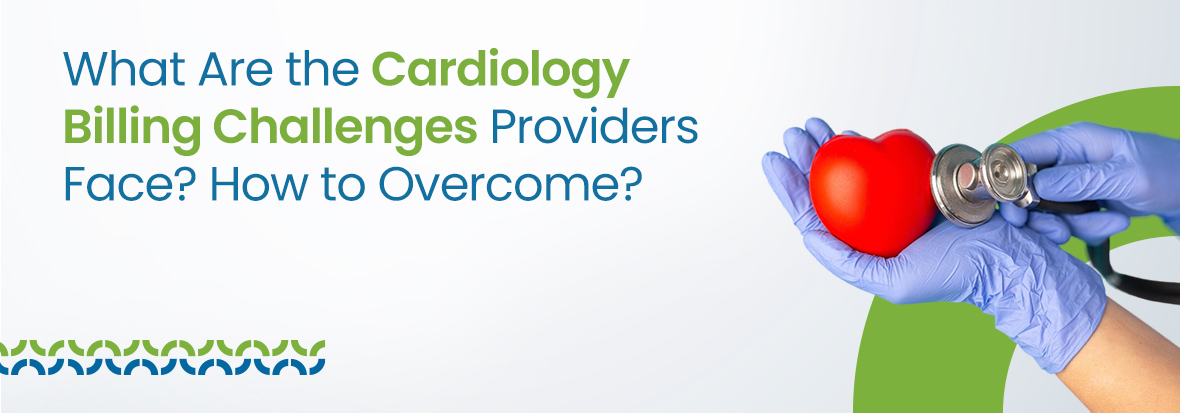Introduction
U.S. healthcare providers lose over $125 billion each year due to billing errors. Cardiology practices alone lose 5–8% of revenue to claim denials, coding mistakes, and missed payments. These losses add up quickly and can hurt the financial health of any practice. Cardiology billing is detailed and time-consuming. It involves multiple procedures, changing rules, and strict payer policies. Small mistakes often lead to delayed payments or rejections.
This article explains the main cardiology billing challenges. It also shares simple, effective ways to fix them and protect your revenue.
What Are the Challenges in Cardiology Medical Billing?
Frequent coding updates have made cardiology billing more complex. Strict documentation rules and rising payer demands mean even small errors can cause lost revenue, denied claims, and compliance issues. Below are the main challenges cardiology practices face today:
Coding Complexity and Documentation Issues
- Procedure bundling creates confusion for cardiac catheterizations and PCI with stent placements.
- Global period tracking for surgeries requires accurate follow-up service documentation.
- Correct use of modifiers (-26, -TC, -50, -RT, -LT, -59, -XS) is essential to avoid denials.
- Each echocardiogram type (2D, 3D, stress, contrast) needs the correct CPT code.
- Nuclear cardiology, cardiac MRI, and CT angiography require precise coding for multiple views and contrast.
- EP studies and ablations must have detailed documentation to meet medical necessity standards.
- New ICD-10 codes for HFpEF require clear documentation of heart failure type.
- Providers must distinguish between systolic and diastolic failure, and note if it’s acute or chronic.
- CAD billing requires documenting native vessels vs. grafts, severity, and complications.
- Documentation should show evidence-based indications, risk-benefit analysis, and alternative treatments.
Prior Authorization and Payer Management
- 85% of commercial payers require pre-authorization for cardiac catheterizations.
- Advanced imaging (MRI, nuclear studies) faces strict approval rules.
- EP procedures and device implants often need multi-step approvals, delaying care.
- Authorizations take 7–14 business days, slowing scheduling and cash flow.
- Emergency cases rarely get retroactive approvals; appeal success is low.
- Medicare Advantage plans vary widely in coverage and approval policies.
- Commercial payer rules differ by region and may include value-based care conditions.
Revenue Cycle Management Inefficiencies
- High Denial Rates:
- 35% for medical necessity
- 28% for incorrect coding
- 22% for missing authorization
- 15% for documentation gaps
- 35% for medical necessity
- Clean claim rate is only 78–82%, below the 85–90% benchmark.
- EMR and billing software often fail to sync, causing missed charges.
- Charge capture automation failures result in revenue loss.
- Eligibility checks and real-time updates often don’t work reliably.
Staffing and Training Issues
- Shortage of certified coders and billers increases errors.
- High turnover disrupts workflows and requires constant retraining.
Frequent Regulatory Changes
- CMS updates and ICD-10 revisions require ongoing training.
- Failure to keep up leads to denials or compliance audits.
Front-End Intake Problems
- Up to 50% of denials start with errors in patient demographics or insurance data.
- Missing referrals or incomplete eligibility verification delays claims.
Poor System Interoperability
- EHR and billing platforms often don’t integrate smoothly.
- Lack of real-time data exchange slows authorizations and claims.
Manual Processes
- Manual workflows increase coding errors and slow processing.
- Paper-based systems make it hard to scale or track denials.
Denials, Appeals, and Audit Risks
- Cardiology has denial rates 15–20% higher than primary care.
- Appeals are costly and have low success for documentation errors.
- Payer audits are rising, increasing compliance workload.
Value-Based Care and Telehealth
- New quality-based models require detailed reporting and different codes.
- Telehealth needs proper modifiers and payer-specific billing rules.
Patient Billing and Transparency
- Balance billing issues create disputes and impact patient trust.
- Lack of upfront cost estimates increases unpaid balances.
Data Security and Compliance
- HIPAA compliance is harder with multiple digital systems.
- Missing documentation can result in penalties and audits.
How Do These Challenges Affect Providers?
Cardiology billing problems go beyond admin delays. They hit your revenue directly. Denials, underpayments, and delayed payments all affect your income.
Revenue Loss
Every denied or underpaid claim means lost money. It also wastes staff time. Many cardiology practices carry overdue accounts for months. That slows down cash flow and reduces collections.
Underpayments are even harder to catch. If no one is watching closely, they go unnoticed. Over time, these small losses add up and hurt your bottom line.
AR Aging and Write-offs
Most claims should be paid within 30–45 days. But many practices have claims aging over 90 days. That’s well above the industry average. The older a claim gets, the less likely it is to be paid. Many are eventually written off. Frequent write-offs point to deeper issues—like coding mistakes or poor follow-up. Old claims are also more expensive to recover. Time wasted equals money lost.
Cost of Denials
Appealing a denied claim isn’t cheap. It can cost between $25 and $118 per claim. That includes staff time, admin work, and follow-ups. Worse, not all appeals succeed. If the denial is tied to documentation or medical necessity, approval rates drop. This means your team may spend hours on unpaid appeals.
How to Fix Cardiology Billing Problems
Small fixes aren’t enough for cardiology billing challenges. You need smart tools, proven processes, and expert support. Cardiology medical billing companies can help practices overcome these obstacles and reclaim lost revenue. Here are the solutions you can look for
Tech Solutions for Cardiology Billing
Modern billing runs on automation and data. The right tools help you avoid errors, reduce denials, and get paid faster.
- AI Denial Prediction:
AI flags risky claims before submission. You can fix errors early, before they cause denials.
- Robotic Process Automation (RPA):
RPA handles routine tasks like claim filing and auth tracking. This saves time and cuts manual mistakes.
- Real-Time Analytics Dashboards
Real-time reports show claim status, denial rates, and AR aging. You get full visibility into your revenue.
These tools work best with a team that understands cardiology and billing tech.
Best Practice Strategies
Technology alone isn’t enough. Successful cardiology billing also requires smart workflows and knowledgeable staff.
- Clinical Documentation Improvement (CDI): Billing experts help providers fine-tune documentation to support coding accuracy, especially for complex procedures and ICD-10 requirements.
- Contract Negotiation Support: Many billing companies assist in analyzing payer contracts and improving reimbursement terms. This can directly increase margins over time.
- Staff Training and Cross-Skilling: Educating front- and back-office staff on cardiology billing requirements, such as modifiers, medical necessity, and prior auth rules, helps prevent errors before they happen.
Why Work With Cardiology Billing Experts?
Specialty billing is complex. A generic billing company may not be enough.
Cardiology billing experts know:
- CPT and ICD-10 codes for cardiac procedures
- Common denial reasons from major payers
- How to stay compliant with changing rules
With the right partner, you’ll see:
- More clean claims
- Fewer denials
- Faster payments
- Better audit protection
In today’s market, expert cardiology billing help isn’t optional. It’s essential.
How to Choose a Medical Billing Company for Cardiology Billing?
Not all billing companies understand cardiology. The wrong choice can cost you time and money. Here’s what to look for when selecting a billing company that truly understands cardiology.
Specialty Expertise in Cardiology
Make sure the billing company has proven experience with cardiology billing and coding. This includes handling:
- Complex procedures like PCI, EP studies, and nuclear imaging
- Modifier usage (-26, -TC, -59, etc.)
- Global period tracking and surgical billing rules
- ICD-10 coding for heart failure, CAD, and comorbidities
Generalist billing companies may not have the knowledge to code and submit claims correctly for high-value cardiovascular procedures.
Track Record of Denial Reduction and Revenue Recovery
Ask for performance metrics:
- Clean claim rate
- First-pass resolution rate
- Denial rate and appeal success rate
A good billing company should improve your collections and reduce AR aging, and they should be able to prove it with data.
Technology Integration and Automation
Look for cardiology billing companies that use the latest tools:
- AI for denial prediction and coding accuracy
- RPA for claims submission and prior auth follow-up
- Real-time analytics dashboards for billing transparency
Technology should support your workflows, not complicate them.
Compliance and Risk Management
Cardiology billing comes with audit risks. Your billing partner should:
- Stay updated with LCD/NCD policies
- Support accurate medical necessity documentation
- Follow HIPAA and payer compliance requirements
Compliance should be built into every part of the billing process.
Support, Training, and Communication
Choose a company that treats you like a partner, not just a client number. Strong relationships lead to stronger results. Look for:
- Dedicated account managers
- Regular reporting and feedback
- Provider and staff training support
- Responsive communication
Scalability and Flexibility
Your cardiology billing partner should be able to grow with you. Whether you’re adding providers, expanding cardiology medical billing services, or moving toward value-based care, your billing team should adjust without disruption.
Top Cardiology Medical Billing Companies
Picking a cardiology billing partner isn’t just about sending claims. You need strong cardiology coding (EP, cath/PCI, device implants). You need denial prevention that matches your payers. You need clean cardiology EHR billing services and clearinghouse workflows. These are the top 5 medical billing companies in the USA.
| Company Name | Services & Features |
|---|---|
| MedCare MSO |
|
| CareCloud |
|
| Tebra (Kareo) |
|
| Revele |
|
| BillingParadise |
|
Cost Analysis of In-House vs. Outsourced Cardiology Billing
Cardiology margins are tightening due to payer pressure, prior auth complexity, and rising overhead. Billing errors and denials reduce net collections and increase compliance risk. Comparing in-house and outsourced billing models helps balance costs, compliance, and cash flow.
Costs of In-House Billing
Staffing Expenses
- Salaries for certified coders/billers, benefits, and PTO.
- Over time, during audits, ICD-10 updates, or denial surges.
- Recruiting, onboarding, and retention (backfill risk when staff leave).
Training and Compliance
- Continuous ICD-10/CPT and payer policy training.
- HIPAA/CMS compliance programs, audits, and documentation.
Technology and Infrastructure
- EHR/PM and clearinghouse licenses; claim scrubber add-ons.
- Hardware, upgrades, and IT support.
- Cybersecurity, backups, and secure data storage.
Productivity Loss
- Manual work queues increase denial rates and rework.
Cash delays from late submissions and insufficient follow-up.
Benefits of Outsourcing to Specialized Billing Companies
Lower Denial and Error Rates
- Access to cardiology-trained coders and editors.
- Rules engines/AI-assisted scrubbing to catch errors pre-submission.
Scalability and Flexibility
- Absorb higher patient volumes without adding FTEs.
- Scale up for seasonality, new providers, or service lines.
Technology Advantage
- Advanced RCM tools and analytics with no upfront capital.
- Clearinghouse integrations and automated A/R workflows.
Compliance and Audit Support
- Standardized policies, audit trails, and payer-specific expertise.
- Proactive credentialing and prior-auth process support.
Cost Predictability
- Percentage-of-collections or flat-fee pricing vs. variable overhead.
- Reduced exposure to turnover, training, and IT surprise costs.
Conclusion
Cardiology billing is hard. Mistakes cost money and time. Rules change every year. Coding and prior authorizations add to the challenge. These issues lead to denied claims. You lose revenue and face compliance risks.
You can fix this. Use better billing tools. Keep your documentation clear. Train your staff well. And consider hiring a billing company that knows cardiology, such as MedCare MSO. They help with billing, coding, insurance checks, claims, denials, and payments. Their system works with yours and speeds up payments. They get a high rate of clean claims and can lift your revenue by 15–20%. A solid billing plan protects your income. It helps your practice run well. Act now. Then, you can focus on what matters most: your patients.

